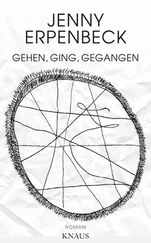Jenny Erpenbeck - The End of Days
Здесь есть возможность читать онлайн «Jenny Erpenbeck - The End of Days» весь текст электронной книги совершенно бесплатно (целиком полную версию без сокращений). В некоторых случаях можно слушать аудио, скачать через торрент в формате fb2 и присутствует краткое содержание. Год выпуска: 2014, Издательство: New Directions Publishing, Жанр: Современная проза, на английском языке. Описание произведения, (предисловие) а так же отзывы посетителей доступны на портале библиотеки ЛибКат.
- Название:The End of Days
- Автор:
- Издательство:New Directions Publishing
- Жанр:
- Год:2014
- ISBN:нет данных
- Рейтинг книги:4 / 5. Голосов: 1
-
Избранное:Добавить в избранное
- Отзывы:
-
Ваша оценка:
- 80
- 1
- 2
- 3
- 4
- 5
The End of Days: краткое содержание, описание и аннотация
Предлагаем к чтению аннотацию, описание, краткое содержание или предисловие (зависит от того, что написал сам автор книги «The End of Days»). Если вы не нашли необходимую информацию о книге — напишите в комментариях, мы постараемся отыскать её.
The End of Days — читать онлайн бесплатно полную книгу (весь текст) целиком
Ниже представлен текст книги, разбитый по страницам. Система сохранения места последней прочитанной страницы, позволяет с удобством читать онлайн бесплатно книгу «The End of Days», без необходимости каждый раз заново искать на чём Вы остановились. Поставьте закладку, и сможете в любой момент перейти на страницу, на которой закончили чтение.
Интервал:
Закладка:
What is a Wednesday?
Beside Frau Millner, Frau Hoffman sits with her eyes shut, counting the seconds, because she knows that the executions start at eight o’clock. Every minute a group of ten prisoners is shot. She silently counts to ten, nodding along with the numbers, and then waits for the next minute to begin. She doesn’t have to look at the clock to know when a minute is over. Finally she has grown old enough to be able to move freely in time.
One. Two. Three.
Frau Schmidt: The Russians blew up Strassmannstrasse 2 because we didn’t clear away the tank barricades quickly enough. We couldn’t move any faster, we were at the end of our strength.
Four. Five. Six.
Frau Podbielski: Sometimes I would mix the insides of plum pits into the dough for the honey cake, did you know you can crack open the pits of plums just like nuts?
Seven. Eight. Nine.
Frau Giesecke: When it was subbotnik , my children always helped gather the pieces of balled-up paper from the bushes.
The day room is full of stories not being told.
Ten.
Even during the week when Frau Hoffmann is going to die, the day after her ninetieth birthday, time is a porridge made of time, it’s rubbery, refuses to pass, has to be killed, spent, served, and still keeps dragging on. What is a Thursday, a Friday? Sometimes in the afternoon this person comes by, this one or that one, and sits, and holds her hand — why? — takes her by the bony shoulder and says: Keep your chin up! Or did no one come at all? The days when someone comes and the days when she just sits there all collapse into a single day, time is a porridge made of time. Who are you? All that remains of life now is what’s left at the very bottom when all the other reserves have been used up: Then the iron reserves make their appearance.
Knit one, purl one, the instructor is helping her.
I’m such an awful sheep.
But you’re doing very well, Frau Hoffmann.
I never understood how it works.
Stick the needle in here and then pull the yarn through.
Oh, I see.
Bravo, Frau Hoffmann.
You know, it’s not that I’m a — what’s the word — a daydreamer. It’s not that. It’s something else: fear.
The iron reserves, fear.
Fear of doing something wrong again.
Fear of the day, fear of the night, fear of the storm and strangers coming to visit, fear of the poison in her food and the nurse who acts friendly but in truth is out to steal her gold bracelet, fear of where the wheelchair she’s sitting in is being pushed, and by whom? Fear of the doctor and of the pain, fear of her son who brought her here, fear of life and fear of death, fear of all the time she still has to live through.
But Frau Hoffmann, there’s nothing to be afraid of.
I have such a great fear of doing something wrong that I always do something wrong.
But look, you’ve already knitted an entire row perfectly, Frau Hoffmann.
No, no, something is always wrong. I know that, there’s no changing it.
Here, now you turn the whole thing over and start again from the beginning.
Is this the right way?
As right as right can be.
It’ll hold together?
Of course, why shouldn’t it?
Approximately eighty years ago, an arts and crafts teacher in Vienna declared the work of one of her pupils sloppy and shoddy . Is it possible that this pupil was given so long a life for the sole purpose of having the sentence uttered by that loathsome Viennese woman finally canceled out, buried by a new sentence uttered by a new teacher? Has she been in the world all these many years just so these two sentences — to give just one example — can confront each other within her, and the good one defeat the bad? Might everything that’s ever been said and that will be said everywhere in the world constitute a living whole, growing sometimes in one direction, sometimes in another, always balancing out in the end? So was this the end?
Knit one, purl one.
I see.
Now turn it over and start again from the beginning.
That’s all there is to it?
That’s all there is to it.
3
A man sits in Vienna at the Café Museum over a glass of mineral water, trying to think what he might bring back for his mother to give her pleasure, his mother who was a child in Vienna. Should he buy her a little bronze St. Stephen’s Cathedral, or a real Sacher torte from Hotel Sacher, or just bring her a twig from a tree on Arenbergplatz, not far from the apartment where she used to live? He can’t imagine that his mother was once a child. A year and a half ago, when he came to bring her to the Home and found her already waiting for him in her hat and coat on a chair in the vestibule, she introduced herself to him as a major in the Imperial and Royal army, ready to march off into battle. Beside her stood a small, dark-blue suitcase, and in her lap she held the little box with the gold buttons. He knew the box well, he’d used these buttons in Ufa to buy two or sometimes even three kilograms of air from his niania ; he’d polished them when he was bored waiting for his mother, often staring at the double-headed eagle. Here in Vienna this eagle spread its wings not only atop the Hofburg, it was everywhere in the city, glancing at the same time to the right and the left: on cast-iron railings, on fountains, above the entryways to buildings, and even on the shop sign of the Trafik where he’d just bought himself a pack of cigarettes — and this although the Kaiser had been dead for three-quarters of a century now. Everywhere here this eagle was still spreading its wings above its two heads, as if to hold them together.
Did time in Vienna really pass so slowly?
Or not at all?
In the Eastern part of Germany, a state had been founded and had remained a state for forty years, had been a quotidian reality for forty years, with new buildings springing up, schoolchildren, the victory of Socialism, please wait to be seated, Heroes of Labor, 10-pfennig streetcar tickets, I’ll petition the authorities, run down to the Konsum and get yourself an ice cream, Karl-Marx-Allee at the corner of Andreasstrasse, the gathering place for May 1, picking cherries in Werder, Ernst Busch singing of the Peasant’s War, the lift is stuck again, Socialist sister countries, dear Comrades — and at some point, after an entire lifetime of life, everyday reality and state had broken apart, had disappeared, been stamped into the ground, wiped off the map, crumbled, been swept aside by the People — but in Vienna, it seemed to him, everything that had always been there had simply endured. Bombs falling on Vienna at the end of the war, as his mother always insisted — this is something he cannot for the life of him imagine, since all the buildings he’s seen here are so vast, so unscathed.
Although he’s traveled to Frankfurt am Main many times since the opening of the border, and also to London, Trieste, and once even to New York with his wife and children to see the Statue of Liberty, the man still privately thinks of Vienna as “the West.” Like it or not, the scent of coffee at Café Museum reminds him of the packages his first girlfriend used to receive from her relatives in the Federal Republic; he can’t stop calling the current era Age of the Winners , and again and again finds himself marveling at how so-called modernity appears to derive its superiority solely from the fact that it’s been around for a good hundred and fifty years now. Like it or not, when he looks at the people here, he sees they are used to driving fast cars, that they know what a tax return is, and have no cause to hesitate before ordering a glass of prosecco with their breakfast. Just the way they let the door slam behind them when they walk in shows him how sure they are of being in the right world everywhere in the world. Now he too is sitting in this right world, he even has the right money in his wallet, although he’s drinking water to conserve his “West money.” No dogs allowed. The signs with the images of the dogs prohibited from entering butcher shops, restaurants and swimming pools existed in East Germany as well, and probably they existed everywhere in the world. The border that used to separate him from the West has long since fallen — but now it seems to have slipped inside him, separating the person he used to be from the one he’s supposed to be now, or allowed to be. I don’t know how you recognize a human being, his mother said to him last time he visited. He doesn’t want prosecco with his breakfast, like it or not. And he couldn’t care less if the others can tell by his way of looking around, by his hair and cheeks, that he comes from the land that has finally, rightly so, thank God, high time now, been wiped off the face of the earth, the land of — what madness — publicly owned enterprises, red carnations for your lapel on May 1, rigged elections, old men wearing berets left over from the Spanish Civil War, and dialectics taught at school. A Man — how proud that sounds. Getting off the night train at six in the morning, he saw people sleeping on pieces of cardboard in the station. In what world had he spent the last forty years? What happened to that world? Will he have the heart of a dog now for the rest of his life?
Читать дальшеИнтервал:
Закладка:
Похожие книги на «The End of Days»
Представляем Вашему вниманию похожие книги на «The End of Days» списком для выбора. Мы отобрали схожую по названию и смыслу литературу в надежде предоставить читателям больше вариантов отыскать новые, интересные, ещё непрочитанные произведения.
Обсуждение, отзывы о книге «The End of Days» и просто собственные мнения читателей. Оставьте ваши комментарии, напишите, что Вы думаете о произведении, его смысле или главных героях. Укажите что конкретно понравилось, а что нет, и почему Вы так считаете.












